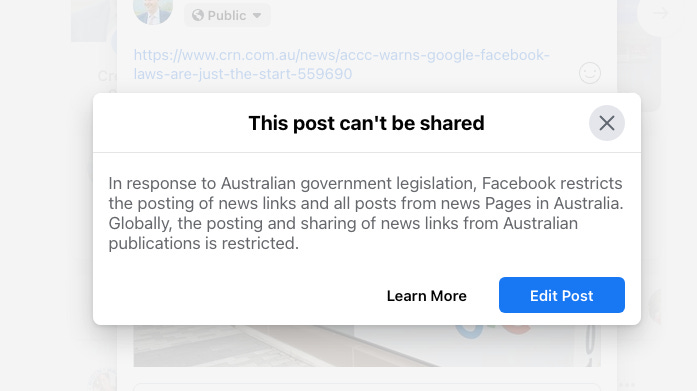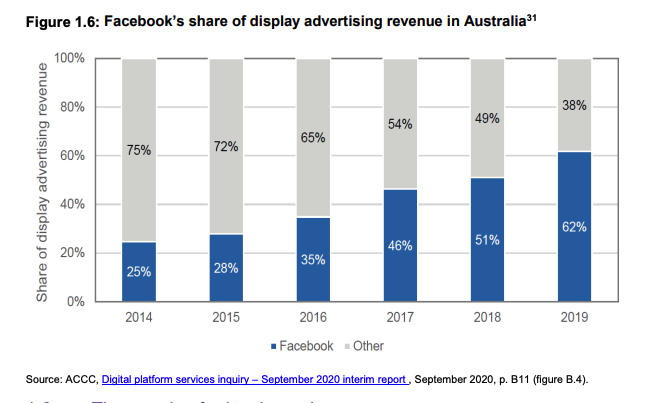Corporate Temper Tantrums
Microsoft screams at U.K. antitrust enforcers. Meta threatens to block news in Canada and California. Crypto squeals at the SEC. It's time to bring these badly brought up pets to heel.
Welcome to BIG, a newsletter on the politics of monopoly power. If you’re already signed up, great! If you’d like to sign up and receive issues over email, you can do so here.
Over the last two years, there has been a lot of policy to rein in the power of monopolies. Today’s piece is about how big business is fighting back against laws they dislike. Last week, for instance, Meta threatened to cut off access to news in Canada if forced to bargain with newspapers. Meanwhile, faced with merger challenges or state-level upholding of safety or labor standards, Microsoft, the Mayo Clinic, and Uber all issued threats to withdraw their services.
So what happens when a business executive threatens to hold his breath until he turns blue? That’s the problem regulators are dealing with.
Before I get to that, some house-keeping. Last week I wrote a piece titled “Monopolies Make it Harder to Have a Baby.” It’s about a shortage and then a price spike of an infertility drug, clomiphene citrate, due to consolidated wholesalers and then a private equity financial scam. I only sent it to paid subscribers, but now it’s out from behind the paywall. You can read it here.
And now…
In 1930, as the stock market crash filtered out into the economy, Congress began pushing back on the Hoover administration’s economic policies. In the early years of the Depression, despite lower wages and farm commodity prices, prices on items made by big business seemed to stay high. One such big business dominated industry was aluminum, which was not only produced by the domestic monopoly Alcoa, but was also protected by a high protective tariff to keep out foreign sources.
Democrats pounced, attempting to reduce the aluminum duty from five cents to two cents a pound. This was good policy, but it was also a thinly veiled attempt to get at the Treasury Secretary, Andrew Mellon, who also, as it turned out, owned Alcoa.
At a key point in the fight, New York Democratic Senator Royal Copeland asked to go back to the old rate of five cents a pound rate. If the tariff dropped to two cents a pound, Alcoa would simply move production - which included the jobs of 10,000 workers in New York - to Canada. Copeland told another Senator that he sought to protect Alcoa on “account of fear of the power of this corporation to bring distress, poverty, and unemployment to the American toiling masses.” The people of this country, he said, “are at the mercy of this monster monopoly, no matter what we do.”
America organized corporations in the 1800s to allow people to work together and build things they couldn’t do alone. It worked extraordinarily well, producing the most vibrant economy the world had ever seen. But the spread of corporations led to a political problem, of the rise of institutions that could challenge state power. Much of the anti-monopoly era, from the 1880s to the New Deal, was organized around this problem, of state power being superseded by those of the corporation.
The traditional American framework, which is based on English common law, characterized private monopolies as governing political forces. John Sherman, the Senator argued for his antitrust bill in 1890 that ”if we would not submit to an emperor, we should not submit to an autocrat of trade.” There’s a reason Sherman used the terminology of politics when discussing monopolization. Monopolies, at their core, threatened the republic.
Senator Copeland was not alone in his fear of dominant firms during the Great Depression. His colleague, Wyoming Senator Joseph O’Mahoney, noted that “many of the modern corporations engaged in interstate commerce are greater and more powerful than most of our sovereign states.” The author of the Securities and Exchange Act, James Landis, argued in 1937 that private managements of big business “possess a coercive force and effect that government even with its threat of incarceration cannot equal.” A similar, and more empowering way to understand big corporations was as John Maynard Keynes told FDR in 1933, which is that they were more akin to “badly brought up” pets.
Until the 1980s, the framework these New Dealers put in place made corporate power a mostly solved problem. But because we refused to retain our laws against concentrations of economic and political power, the monopolists are back. And they are challenging our democracies once again. In a nod back to the 1930s, Republican Senator John Kennedy claimed a few years ago that, “Facebook is no longer a company, it's a country.” And last week, Federal Trade Commission Chair Lina Khan, whose commission is suing Facebook discussed how private power can be as dangerous as government power.
Meta Blocks the News
For decades, most financiers have been told they are more than middlemen channeling savings to investment, but that they are changing the world. Entire TV networks and newspapers are dedicated to telling them that they - and not elected leaders and regulators - are the legitimate governors of society. Federal Trade Commissioner Rohit Chopra complained about this attitude when he said regulatory “orders are not suggestions” in response to so much flouting of government orders.
What I’ve noticed, as more public officials begin drawing lines against bad conduct, is that financial leaders are getting more aggressive about attacking democratic institutions themselves. This is a good thing, not that monopolies are attempting to subvert democracy, but that our government is finally acting to provoke such a response. There’s lobbying and public attacks on the policymakers putting forth rules. For instance, the Wall Street Journal editorial page has written 64 attacks on Khan in less than two years.
But it’s more than lobbying - dominant firms are starting to use the infrastructure they control. Last week Meta issued a threat to Canada, blocking the sharing of news on Facebook and Instagram for 5% of its users in response to the potential passage of a law forcing the firm to negotiate with newspapers over ad revenue. It’s a particularly notable time to block news to Canadians at random, considering there are out-of-control wildfires in Alberta and Nova Scotia. But Meta was explicit, writing “we intend to end the availability of news content in Canada permanently following the passage of Bill C-18.”
Meta has issued these threats to democratic states before. When Australia passed a version of the bill to force negotiations with publishers, Zuckerberg temporarily blocked access to news in the country, in what whistleblowers called a deliberate act of sabotage to cause chaos. Here’s what users saw.
The proposed law, which I’ve written about before, would help save newspapers from the consolidation of advertising revenue and content distribution in the hands of Google and Facebook. (Google and Meta jointly control the software plumbing underneath online advertising, and use that power to redirect ad revenue from publishers to themselves. Google’s particular dominance in this area is the subject of a high-profile antitrust suit that’s going to trial later this year.)
Normally such threats don’t matter, because most firms, if they stop offering services, will simply find their competitors stepping in to take their market share. However, there is a subset of firms whose size, and very control of public infrastructure, means that they aren’t just powerful, but essential facilities, or private governments. Meta is in that subset of firms. Here, for instance, is a chart put out a few years ago by the Australian government showing how Facebook ruled the advertising ecosystem.
And you don’t need to take my word for it, here’s Mark Zuckerberg making the case years ago.
“In a lot of ways, Facebook is more like a government than a traditional company. We have this large community of people, and more than other technology companies we’re really setting policies.”
California is considering a similar journalism bargaining bill, and Meta is making the same threat of removing the sharing of news in that state. To Meta, laws are suggestions.
BIG is a reader-supported newsletter focused on the politics of monopoly and finance. This is journalism and advocacy that challenges power, so please consider a paid subscription. You can always get lies for free. The truth costs a few bucks, but in the long run it’s much cheaper.
As another example of this battle between democratic power and corporate power, this week, Microsoft President Brad Smith is going to meet with the Chancellor of the United Kingdom, Jeremy Hunt, to complain about Britain’s Competition and Markets Authority blocking the firm’s $69 billion takeover of video game giant Activision. After the CMA stopped the merger, Smith issued a latent threat, talking about how his firm invested huge amounts in cybersecurity to defend Great Britain, and how the E.U., which approved the deal, is a “better place” to do business.
Microsoft is now considering the extreme step of buying Activision and simply removing its games from the whole of the U.K., foregoing revenue purely to punish a nation-state. And since Activision’s games are must-have for gamers, this is a way to deny what is quasi-public infrastructure. One irony here, as Doug Creutz from TD Cowen noted, is that Microsoft’s threat actually makes the antitrust case pretty well. On its own, there’s no way that Activision could leave the U.K., as that loss of revenue would be devastating. Microsoft’s revenue is big enough so that if it buys Activision, it can actually put that option on the table and investors won’t really care.
Microsoft’s threat has sent a powerful message. British political elites are split over the CMA’s decision. Much of the press is angry at Microsoft, but high-level politicians like Hunt are saying that enforcers must “understand their wider responsibilities.” I don’t know that the CMA’s decision can be reversed at this point, which is good, but the UK antitrust enforcers spent a lot of political capital.
Here are a few more examples of the conflict between corporations and states.
Uber: A few weeks ago, Uber threatened to pull out of Minnesota if a new bill mandating minimum wages for drivers went into effect. The governor vetoed the bill.
The Mayo Clinic: Last month, the Mayo Clinic, a massive health care force in Minnesota, said it would stop a $1.1 billion investment in the state if it were forced to comply with minimum nursing standards and had to control certain health care costs. The state carved out loopholes for the hospital giant.
Apple: In March of 2021, Apple threatened North Dakota if the state passed a bill challenging the phone giant’s 30% app fees. “Apple has deeper pockets than the state of North Dakota,” state Senator Kyle Davison told me. “Apple would just ignore the law and proceed until they get sued.” If Apple did so, then state legislators feared they would have to spend taxpayer money trying to bring Apple to heel, money that would otherwise go to schools or roads. North Dakota didn’t pass the bill.
Merck: This week, the giant medical firm Merck filed a lawsuit arguing that a law passed by Congress mandating that the government negotiate over pharmaceutical prices is unconstitutional. The firm alleges that the government is violating the 5th Amendment prohibition against unlawful seizures of property, since it is only paying “fraction of the drugs’ fair value.”
Amazon: In 2019, Amazon pulled its ‘second headquarters’ out of New York City after some political officials raised concerns over worker safety standards.
Google: In 2019, Google threatened to cut off Turkey’s supply of Android phones, if the antitrust authorities demanded changes to its exclusive contracting arrangements with phone manufacturers. Since the Android operating system represents a majority of the phones sold worldwide, this threat was very serious.
J.P. Morgan: Earlier this year, the Federal Reserve and the Treasury Department relied on Jamie Dimon’s J.P. Morgan, as well as five other large banks, to deposit $30 billion into an insolvent First Republic bank. In return for this fusion of private and public power, bank regulators allowed J.P. Morgan to ultimately acquire the firm.
Most of the time, when big business cries wolf on a law, it’s an empty threat. Amazon ended up putting jobs in New York without subsidies, and hospital mergers are going to be tougher in Minnesota. Facebook didn’t ultimately stop sharing of news in Australia, and Microsoft will relent if forced. Usually big corporations will find ways of working within the law, and then they will pretend they had always been operating that way.
And we can see the end state by looking at the crypto industry, which in many ways is the purest distillation of the finance-friendly ideology that has caused so much damage. Over the course of the last five years, crypto leaders have stated many times in many forums that any attempt to impose constraints on their industry would lead to catastrophe, often the offshoring of the industry to places with less regulation.
This week, Chair Gary Gensler of the Securities and Exchange Commission has essentially moved to shut down crypto trading in the U.S. On Monday, the SEC alleged that the biggest crypto exchange in the world - Binance - is effectively a criminal conspiracy that co-mingles customer funds. Today, it went after Coinbase, which the SEC claims is running a securities exchange without a license.
Basically, Gensler is saying that speculating in various Ponzi scheme instruments is against the law. It’s a great thing the SEC is de facto banning the industry - as longtime readers know, I called crypto a scam at its height. But crypto leaders aren’t taking it lying down. Like Microsoft, Meta, Uber, et al, Coinbase’s CEO, Brian Armstrong, came close to offering a threat to the U.S., saying that innovation will now go offshore, weakening “our national security posture.” Armstrong’s threat won’t matter, because everyone can see the clownishness on display. Gensler will win, and the result is that investments are going to go into far more fruitful areas of innovation.
Still, the reason crypto leaders openly mock the law, and angrily scoff at the cops who try to stop them, isn’t because they are criminals, but because they are mimicking big business leadership. They are badly brought up pets.
But now, because of policymakers courageous enough to take on corporate power, we must explicitly face the question put forward by big business leaders, who feel they are the legitimate organizers of our society. Some of these fights will end up decided by courts, some by legislatures, and some in board rooms. But it is a challenge we have faced before. It can be scary to come face to face with such raw power. But ultimately, having, and then winning this fight, is what it means to build a democratic society.
Thanks for reading! Your tips make this newsletter what it is, so please send me tips on weird monopolies, stories I’ve missed, or other thoughts. And if you liked this issue of BIG, you can sign up here for more issues, a newsletter on how to restore fair commerce, innovation and democracy. And consider becoming a paying subscriber to support this work, or if you are a paying subscriber, giving a gift subscription to a friend, colleague, or family member.
cheers,
Matt Stoller





The threat of Uber leaving a market should be filed in the "don't threaten us with a good time" category. After Uber left Denmark over having to comply with some rules they comply with elsewhere (namely that cars and drivers must have commercial registrations to run a taxi service) they left.
Now we have 4-5 different Taxi apps that compete on service, price and where they're available. Uber would have never had a national footprint anyways, meaning there would always have been a need for other taxi apps, but now they also get a chance to compete in the large cities. One taxi app I particularly like has only electric vehicles, something that has pushed everyone to introduce electric options
I have a suggestion for you if you want to get deeper into the monopolies and video games stuff. Check out the history of Electronic Arts and why they once beat out Bank of America for the most hated American company.